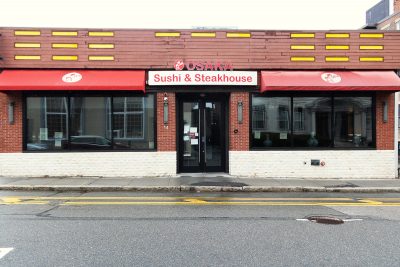Mayoral candidate and Boston City Councilor Andrea Campbell unveiled her Restaurant Recovery Plan March 29, as Boston’s restaurant scene hopes to return to its feet following a year of public health restrictions.

The plan includes waiving liquor license fees for 2022, capping third-party delivery fees at 15% and making restaurant workers eligible for the COVID-19 vaccine.
The plan has been endorsed by several Boston-based chefs, including Michael Serpa — partner at Select Oyster Bar in the Back Bay — among others, according to a press release announcement.
Chris Haynes, president and founder of CBH Communications — a public relations firm that represents dozens of restaurants across Boston — said his clients saw significant business losses in March 2020, adding that Campbell’s plan was “on the money.”
“I think, obviously through all this tragedy, we have to look at what good that’s come out of it,” Haynes said. “What’s the cliché? After a storm, there’s a rainbow.”
Campbell also proposes establishing a new Hospitality Division composed of relevant city departments to streamline the opening process for new restaurants, in addition to creating a Hospitality Advisory Council of industry members.
In an industry with razor-thin margins, third-party delivery fees can be a burden on local restaurants.
Capping fees is essential to supporting equity within the industry, according to a spokesperson for Campbell’s campaign.
Bonnie Nag, general manager at Toro Boston, said she supported the cap.
“There’s no solution that’s going to work for everybody,” Nag said. “Whatever’s going to be best for more people I think is the way to go.”
Campbell’s plan also includes an effort to “Make Boston’s Restaurant Industry More Equitable and Inclusive,” calling for the City to contract with diverse vendors and reform its liquor licensing process, which requires significant initial investment and grants few licenses to Black-owned establishments.
A 2015 study by the Federal Reserve Bank of Boston, Duke University and The New School that found the average Black family in Boston had a median net worth of $8, while that of the average white family was nearly $250,000.
Forgiving 2022 liquor licenses could save some businesses hundreds of thousands of dollars, according to the plan, although few of the city’s 1,100 liquor licenses belong to Black business owners.
Haynes said many restaurants that were previously unable to offer patio seating were given temporary permits during the pandemic — expanding onto sidewalks and into parking spaces.
“Union Oyster House, what are they, 200 years [old]? They were never allowed a patio,” Haynes said. “Out of the pandemic came a really wonderful thing.”
Nag added that the ability to increase seating outdoors has been valuable to Toro.
“Where we’re situated in the South End, we’ve been really lucky,” Nag said. “They gave us a lot of outdoor space last year.”
Campbell proposes making those patio expansions permanent and working with developers and landlords to increase access to ground-floor space in an effort to bolster economic activity.
The restaurant plan further seeks to expand on programs like Open Newbury Street — which temporarily closed vehicle traffic on the street to convert it into community space — specifically emphasizing similar programs in communities of color.
“Boston must do more to support restaurants through the remainder of the pandemic,” Campbell said in a statement, “and to accelerate a rapid recovery of our restaurant industry as soon as the pandemic is over.”
























































































































Susan Holaday • Apr 6, 2021 at 7:21 pm
Great piece!
Susan Holaday • Apr 6, 2021 at 6:49 pm
Good to read a post about the Boston restaurant scene with positive news.